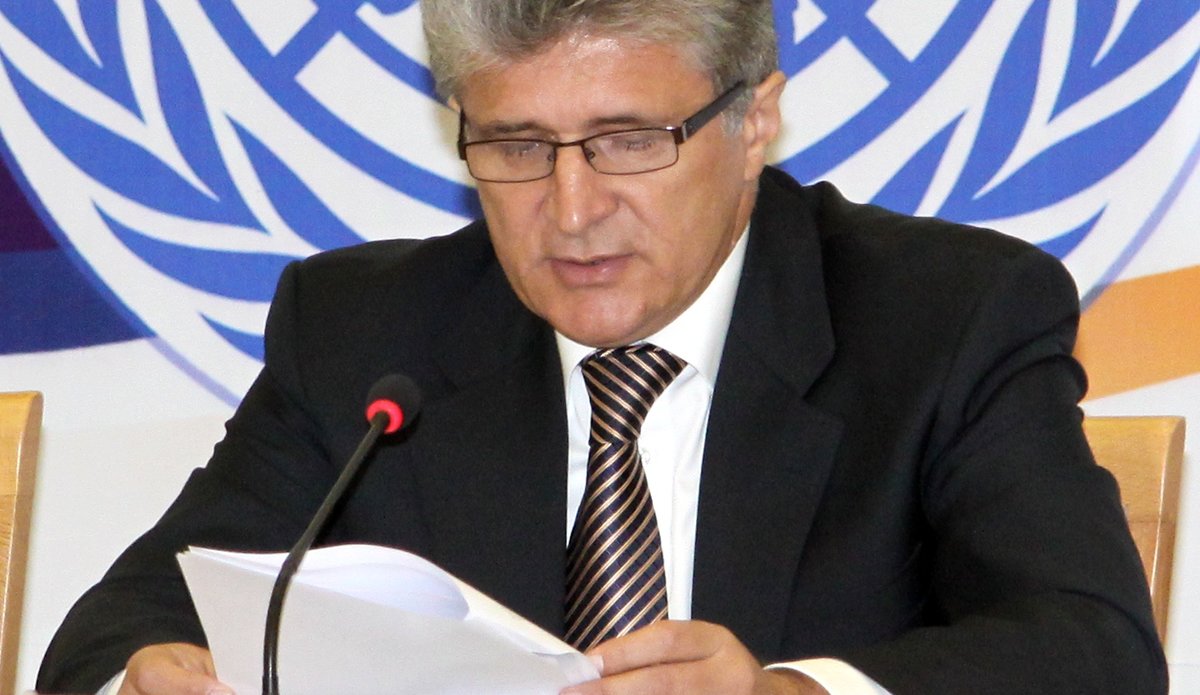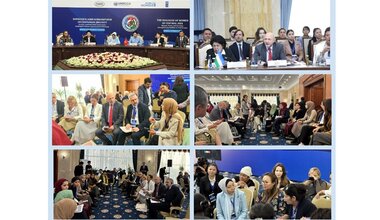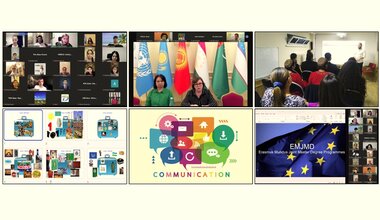Speech by Miroslav Jenča at the working session of the Conference “Five Years of Activities of UNRCCA – Outcomes, Challenges and Possible Responses”
ASHGABAT, Turkmenistan
Dear Deputy Chair of the cabinet of Ministers and Minister of Foreign Affairs of Turkmenistan Rashid Ovezgeldyevich,
Under-Secretary-General for Political Affairs Jeffrey Feltman,
Excellencies, dear guests, ladies and gentlemen,
It is a great pleasure to celebrate UNRCCA's fifth anniversary together with you. I am grateful to the Ministry of Foreign Affairs of Turkmenistan for the hard work they have done to help us put together this conference.
Let me at this place congratulate you, Rashid Ovezgeldyevich, and the Ministry of Foreign Affairs under your leadership on the occasion of the 17th anniversary of Turkmenistan's Neutrality. Tomorrow it will be 17 years ago that the United Nations General Assembly unanimously adopted resolution A/50/80, recognizing and supporting the permanent neutrality of Turkmenistan.
In addition to my opening remarks during the first plenary session of the Conference I would like to focus on our activities.
Following the implementation of UNRCCA's first Programme of Action (2009-2011), we developed a follow up Programme (2012-2014) in close consultations with all Central Asian countries. Based on the views received from the countries during these consultations, the Centre is now implementing activities focused on mainly three broad areas 1) the impact of trans-boundary threats facing the region, 2) implications of national developments on regional stability, and 3) management of common natural resources and environmental degradation.
Only through this approach can durable and mutually acceptable solutions be found that will help ensure long-term peace and security throughout the region. To this end, the Centre also maintains close co-operation with bilateral partners, international and regional organizations as well as with UN structures operating in the region.
In the five years since its establishment, UNRCCA has been actively involved in preventive diplomacy efforts across a range of issues of high importance to the region, with the aim of building trust and strengthening cooperation between the Central Asian countries, thus reducing the risk of conflict or, in some cases, the relapse into violence. Today's conference provides us with an opportunity to take stock of the Centre's achievements and progress made in dealing with some of the challenges to peace and security in Central Asia.
Let me highlight a few specific examples of our work in the region in the past five years.
The Centre works to identify targeted and sustainable solutions to cross-border threats such as terrorism, extremism and drug-trafficking. As you know, one year ago in Ashgabat, a Joint Plan of Action aimed at the implementation of the UN Global Counter-Terrorism Strategy in the context of Central Asia was presented; the first such regional plan of its kind. We are now about to commence to the next stage, with a set of projects focused on implementing the deliverables in the JPoA. The projects focus on addressing conditions conducive to the spread of terrorism and on enhancing counter-terrorism capacity-building in the region; aiming to implement the Joint Plan of Action in a comprehensive and coordinated manner. For this undertaking to be successful, close cooperation with the Governments of Central Asia and relevant regional and international organizations is of key importance.
Counter-terrorism efforts in Central Asia also complement activities that form part of the Istanbul Process, which aims to strengthen security by promoting cooperation among the countries of the "Heart of Asia" region, including Afghanistan. In this context, UNRCCA is acting as a supporting partner in the implementation of confidence-building measures related to counter-terrorism, as identified in the Kabul Ministerial Conference Declaration.
Connected to this and in line with its mandate, throughout the past five years, UNRCCA has been closely liaising with the UN Assistance Mission in Afghanistan (UNAMA) to ensure a comprehensive and integrated analysis of the situation in the region and to support strengthened links between the countries of Central Asia and Afghanistan; which could help efforts to stabilize the situation both within Afghanistan and across the broader region. Representatives of the Afghan Government and UNAMA are regularly invited to attend relevant events organized by UNRCCA.
Another complex issue that the Regional Centre has been dealing with is the management of trans-boundary water and energy resources in Central Asia, which poses one of the most difficult challenges for the region. While positive developments have taken place in bilateral negotiations between some Central Asian States, serious disagreements remain in particular between upstream and downstream countries over the construction of major hydropower installations on cross-border waterways. Against this backdrop, the Centre provides a political platform for consultations among the Governments of Central Asia so as to promote dialogue, build trust and identify elements that could ultimately form a sustainable solution for water-sharing in the region; based on international law and taking into account the interests and needs of all the countries affected. A specific example of the work of the Centre is its active promotion of discussions on the establishment of an early warning system related to potential trans-boundary water problems in the region. In this connection, a first regional early warning bulletin was produced this year, in cooperation with the Executive Committee of the International Fund for Saving the Aral Sea. Further, to promote cooperation between the countries of Central Asia on water-dependent sectors of their economies, the Centre in cooperation with FAO has convened a number of workshops in which a set of scenarios concerning the integrated use of water-resources in the region have been elaborated; thus demonstrating how certain actions may affect different situations over time. We hope that this approach can help parties to generate alternative options regarding their use of water; thus improving planning for the future and reducing the risk of exacerbation of disputes.
Most recently, we have shared with the Governments of Central Asia a "Proposal for Modernizing the Legal Framework for Transboundary Water Management in the Aral Sea Basin". The proposal based on norms and principles of international law, constitutes a framework of principles and procedures that would allow for a fair and balanced use of the shared waters of the basin. Consultations with Central Asian Governments and experts regarding this proposal will take place in the first half of 2013.
The Centre has also played a role in preventing the relapse into violence in the region. In Kyrgyzstan, UNRCCA's presence on the ground allowed it to engage actively from the very beginning of the crisis that took place in the country in the spring and summer of 2010. I visited the country several times both during and after the immediate crisis for talks with high-ranking national authorities, other political actors, civil society and representatives of ethnic minorities both in Bishkek and Osh.
Joint visits and interventions by the so called "Troika", consisting of the Special Envoys of the EU, the OSCE and myself, helped prevent a relapse into violence in Kyrgyzstan; thus demonstrating the value of cooperation between regional and international organizations in crisis situations. I should like to stress that eventually it was the peoples of Kyrgyzstan who decided to go for peace and not war. The UN also worked closely with international organizations. UN agencies constructed shelters and implemented projects to improve the daily lives of the population affected by the violence.
Another important aspect of UNRCCA's work is capacity building. The Centre aims to provide future generations of diplomats and political practitioners in Central Asia with the necessary skills to successfully address the challenges the region faces through the use of preventive diplomacy. Through this work, we aim to contribute to long-term efforts to maintain peace and stability in the region.
Looking forward, Central Asia is likely to continue to face cross-border threats and challenges emanating from the water and energy nexus. This will require our continued focus and improvement.
To discuss such existing and potential threats, we convened the fourth annual meeting of Central Asian Deputy Ministers of Foreign Affairs in Bishkek in October this year. One of the key messages coming out of that meeting was the need for political will amongst the governments of the region to engage in a meaningful bilateral and/or multilateral dialogue. The governments of Central Asia demonstrated such political will when the Regional Centre was established. I believe that our efforts to increase trust between the countries of Central Asia can in turn help to reinforce their political will and strengthen their resolve to jointly tackle the challenges before them.
Another precondition for success is the cooperation and coordination with regional organizations such as the OSCE, SCO, CIS, EU, CSTO, CICA, ECO, NATO, and IFIs to name just a few, to ensure durable peace and create conditions conducive to sustainable economic growth and prosperity in the region. Cooperation with International Financial Institutions is particularly important to jointly advance approaches on how to engage the countries in regional cooperation. I would also like to stress the importance of UN Resolution 1325 which among other things stipulates the importance of involvement of women in peace-building and conflict prevention. We strive to enhance this among other through a regular dialogue with women organizations across the region.
Mr. President,
UNRCCA as the only UN political body with a Central Asia-wide mandate is uniquely positioned to assist the Central Asian countries in finding solutions to the most pressing problems in the region. I would like to repeat a point I made in the beginning of my presentation: We do not insist on pushing blueprint solutions, but facilitate tailored, targeted solutions that suit the needs and interests of all sides involved, and we do that through means of dialogue facilitation and negotiations.
To this end, I look forward to continuing our cooperation with the governments of Central Asia and our colleagues in regional and international organizations and bilateral partners.
Excellencies, ladies and gentlemen!
Let me finish my presentation by once again expressing my heartfelt gratitude to you for joining us for the celebration of the fifth anniversary of our Regional Centre. I can assure you that my team and I, in joint efforts with our partners in regional and international organizations and within the United Nations Country Teams in Central Asia, will continue to support the countries of Central Asia in their efforts to achieve a prosperous future in peace and stability.
Thank you.
 UN
UN





